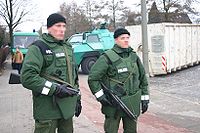
Schutzpolizei
Encyclopedia

Landespolizei
thumb|[[Germany|German]] police officer in [[Hamburg]]The Landespolizei are the main police forces of Germany. They are under the sole jurisdiction, funded and operated by the states of Germany.-History:...
, the state level police of the German states. Schutzpolizei literally means security or protection police but is best translated as Uniformed Police.
The Schutzpolizei has by far the largest number of personnel, is on duty 24 hours a day and has the broadest range of duties. On patrol duty, mainly in vehicles, they keep their respective area under surveillance. As in most other countries, the uniformed police in Germany are usually the first to arrive at the scene of an incident, whether it is a murder or traffic accident. They also take the initial action (Erster Angriff), even if the case is handed over to investigators of the Kriminalpolizei
Kriminalpolizei
is the standard term for the criminal investigation agency within the police forces of Germany, Austria and the German-speaking cantons of Switzerland. In Nazi Germany during 1936, the Kripo became the Criminal Police Department for the entire Reich...
(Kripo) later.
These police officers are also responsible for promoting public safety, crime prevention, criminal prosecution and traffic control.
World War II
During the time of the Nazi regime the Schutzpolizei became a part of the OrdnungspolizeiOrdnungspolizei
The Ordnungspolizei or Orpo were the uniformed regular police force in Nazi Germany between 1936 and 1945. It was increasingly absorbed into the Nazi police system. Owing to their green uniforms, they were also referred to as Grüne Polizei...
, an organ of the Nazi state.
In 1943-1944 German Schutzpolizei murdered about 2000 Polish
Poles
thumb|right|180px|The state flag of [[Poland]] as used by Polish government and diplomatic authoritiesThe Polish people, or Poles , are a nation indigenous to Poland. They are united by the Polish language, which belongs to the historical Lechitic subgroup of West Slavic languages of Central Europe...
civilians in street executions in occupied Warsaw
Warsaw
Warsaw is the capital and largest city of Poland. It is located on the Vistula River, roughly from the Baltic Sea and from the Carpathian Mountains. Its population in 2010 was estimated at 1,716,855 residents with a greater metropolitan area of 2,631,902 residents, making Warsaw the 10th most...
, until the outbreak of the Warsaw Uprising
Warsaw Uprising
The Warsaw Uprising was a major World War II operation by the Polish resistance Home Army , to liberate Warsaw from Nazi Germany. The rebellion was timed to coincide with the Soviet Union's Red Army approaching the eastern suburbs of the city and the retreat of German forces...
.

